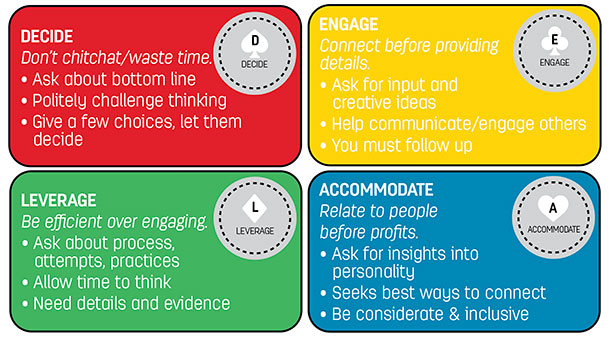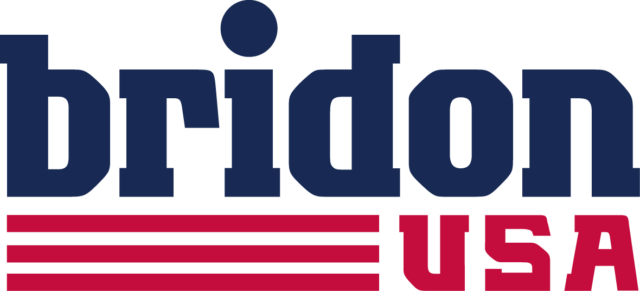However, Swindling took an interesting approach to negotiation, focusing on effective communication with people who approach things differently than you do, rather than “how to get your way with people.”

Swindling outlined four different personality types (graphic above):
Decide: People with the Decide trait tend to go straight for the bottom line. They don’t need or want small talk or personal anecdotes and can come across as abrupt and rude, or even intimidating.
Engage: Engaging people are very outgoing and personable. They are the kinds of people who get along with everybody and are very good at connecting with people. They prefer making those connections before they get down to brass tacks.
Leverage: Leverage people don’t typically care about small talk or personal details. They prefer getting things done right and as efficiently as possible.
Accommodate: Accommodators will relate to people before profits. They are more about the personal effect of a decision than the profit margin. (Example: “This program helps thousands of people” versus “This will make you money”)
I know that we have probably seen and dealt with many iterations of these personalities and probably identified some of these traits in ourselves, and it’s easy to see how each type could rub another one the wrong way.
Swindling had all the attendees create a scenario where they would be negotiating with someone – a family member, an employee, the banker – and split up in teams of three to role play these situations. Two acted it out, while one observed. I fall in the Accommodate category, so I obviously ended up going first. The other person in my scenario was a Decide. Now, I don’t even remember what my imagined scenario was anymore or what I said, but I remember that after I finished, the producer that was observing us asked me, “Did you know you flinched while you were talking?”
That’s right, ladies and gentlemen, in a negotiating scenario, I cringe like someone is dangling a snake over my head. Remind me never to play poker.
So why did I flinch? Was I just feeling awkward? The answer is yes, 100%, but there’s more to unpack here. I don’t have a problem being told no, but I’d rather avoid the situation altogether. I hate asking for things, especially if that question is going to involve a long discussion as to whether or not I actually deserve it. Even an imaginary scenario of doing this makes me want to turn inside out. Does anyone else feel that way?
Does anyone else avoid asking a question or having an essential conversation for fear of coming across as foolish, weak or vulnerable? Does anyone else refuse to ask for help or more information about something because you don’t want to sound stupid? How many of us have gotten the response, “Why didn’t you say so?” or “Why didn’t you just ask me?” Have you ever walked out of a meeting feeling like you failed because you were not able to get your thoughts across or have a deal fall through because you haven’t been able to reach an acceptable compromise?
I feel like this is very common in our industry, and there really is no fix for it except to bite the bullet and ask the question, ask for help or open that can of worms that is festering on your shelf. Even if it makes you uncomfortable, you have to take that step. Knowledge is power, and if you don’t ask, you’ll never know.
My main takeaway from that session was – none of us are mind readers. We all struggle to put our thoughts into the right words so that we can share with others. If you are trying to achieve something through a conversation or negotiation with someone else, whether it’s solving a disagreement with an employee or family member or trying to get a good deal on feed or equipment, make sure you’re taking the viewpoint of the other guy into consideration. It needs to be about them, not you.
Instead of communicating on your comfort level, try communicating in a way that best reaches the other person. I think you could see amazing differences in your relationships with the folks at work and the folks at home. But for heaven’s sake, don’t flinch. ![]()
-
Carrie Veselka
- Editor
- Progressive Cattle
- Email Carrie Veselka







